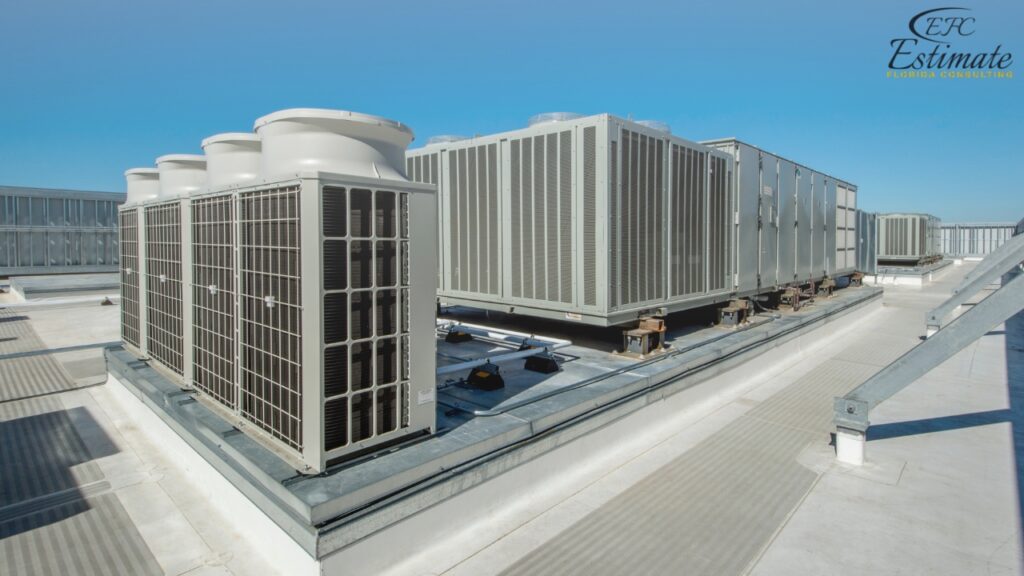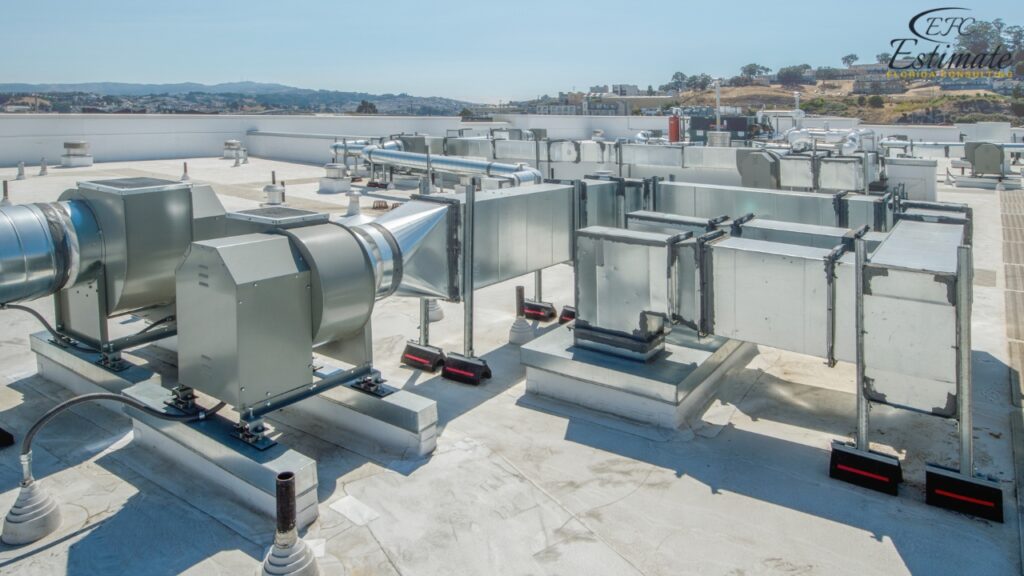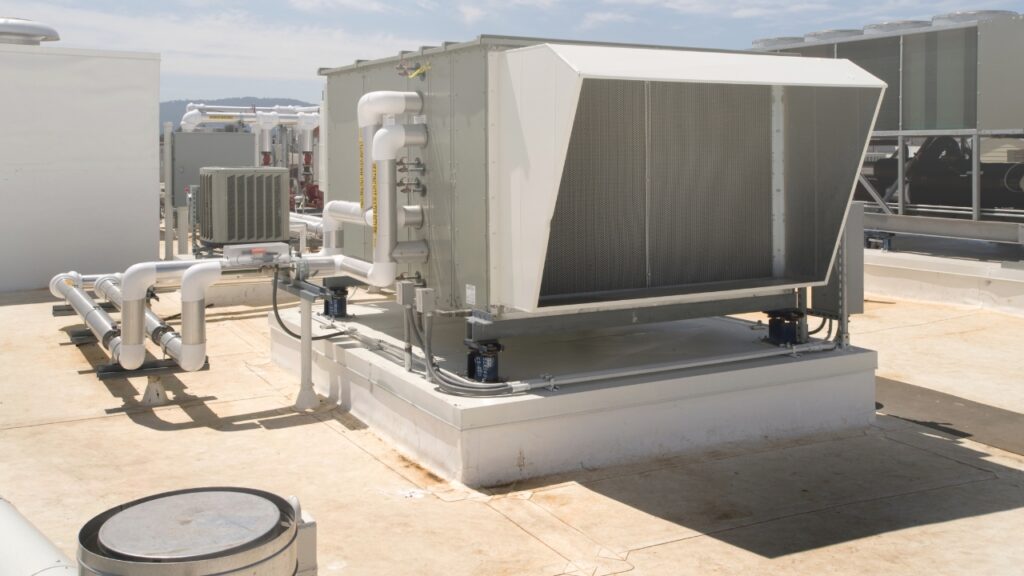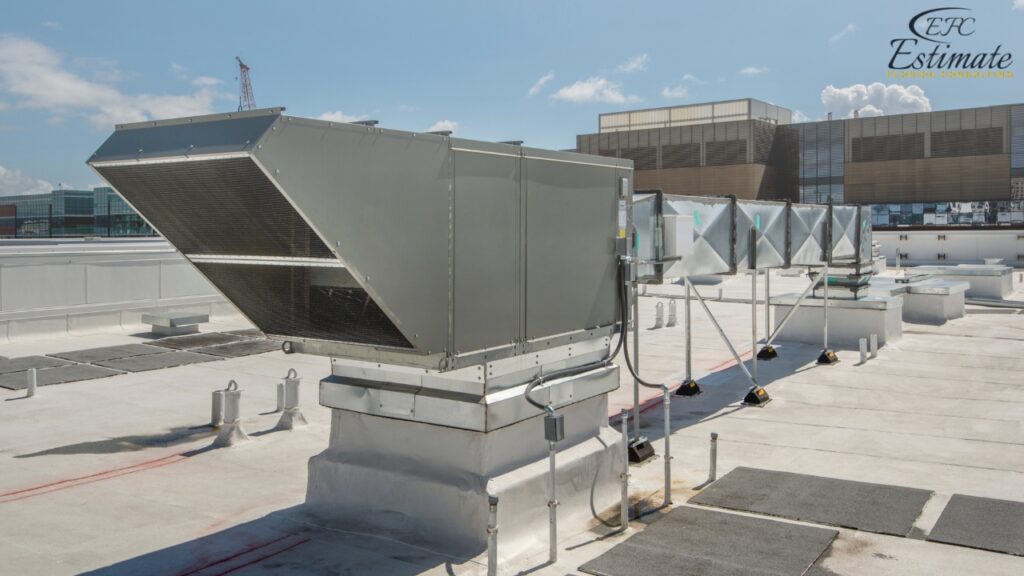Cannabis Facility HVAC Cost Estimator
Installing an HVAC system in a cannabis facility typically costs between $130,000 and $434,500, averaging $50 to $100 per square foot. This estimate includes specialized HVAC units, ductwork, installation, and necessary permits. Costs vary based on the facility size, system efficiency, complexity, and local labor rates. High-efficiency systems with features like precise climate control, humidity regulation, and air purification can increase the total cost. Additional expenses may arise from electrical upgrades, structural modifications, or integrating advanced control systems. Investing in a quality HVAC system ensures optimal performance, energy efficiency, and compliance with industry standards, enhancing the facility’s productivity and crop quality.

Cost Breakdown for HVAC Installation in a Cannabis Facility
Equipment Costs
Here’s a breakdown of the estimated equipment costs for different HVAC systems:
HVAC System Type | Cost per Sq Ft | Total Cost for 10,000 Sq Ft |
Split Systems | $8.00 – $15.00 | $80,000 – $150,000 |
Packaged Units | $7.50 – $14.00 | $75,000 – $140,000 |
Variable Refrigerant Flow (VRF) | $10.00 – $18.00 | $100,000 – $180,000 |
Dehumidification Systems | $5.00 – $10.00 | $50,000 – $100,000 |
The equipment cost is a significant part of the total expense. Choosing the right system involves balancing efficiency, capacity, and budget considerations. Each type of system offers unique benefits, so it’s important to select one that meets the specific needs of your cannabis facility.
Ductwork Costs
Ductwork installation costs can vary based on the type and complexity of the system. Here’s an estimate of the ductwork costs:
Ductwork Type | Cost per Linear Ft | Total Cost for 1,000 Linear Ft |
Flexible Ductwork | $6.00 – $9.00 | $6,000 – $9,000 |
Rigid Ductwork | $9.00 – $15.00 | $9,000 – $15,000 |
Semi-Rigid Ductwork | $8.00 – $12.00 | $8,000 – $12,000 |
Proper ductwork installation is crucial for efficient system performance. Choosing the right type of ductwork and ensuring it is installed correctly can prevent issues like air leaks, poor airflow, and increased energy consumption.
Labor Costs
Labor costs can vary based on the complexity and size of the installation. Here’s an estimate of the labor costs:
Installation Complexity | Labor Cost per Sq Ft | Total Labor Cost for 10,000 Sq Ft |
Simple | $5.00 – $8.00 | $50,000 – $80,000 |
Moderate | $8.00 – $12.00 | $80,000 – $120,000 |
Complex | $12.00 – $16.00 | $120,000 – $160,000 |

Labor costs are influenced by the system’s complexity and the skill level required. Simple installations with fewer specialized requirements will cost less in labor compared to more complex installations involving advanced techniques and equipment. Skilled labor is essential for ensuring the HVAC system is installed correctly and operates efficiently.
Additional Costs
Additional costs can include permits, system design, and any necessary modifications to the building structure. Here’s an estimate of these additional costs:
Additional Component | Estimated Cost |
Permits | $1,500 – $4,500 |
System Design | $10,000 – $20,000 |
Structural Modifications | $10,000 – $50,000 |
Miscellaneous Supplies | $2,500 – $5,000 |
These additional costs can add up, so it’s essential to factor them into your overall budget. Proper system design and the right modifications are crucial for ensuring the performance and longevity of the HVAC system. Including these costs in the initial budget helps in avoiding surprises and ensuring the project stays on track. Detailed planning and thorough assessments can help in identifying potential additional costs early in the project.
Factors Influencing the Cost of HVAC Installation in a Cannabis Facility
Type of HVAC System
The type of HVAC system chosen plays a significant role in the overall cost of the project. Here are some common options for cannabis facilities:
- Split Systems: Split systems consist of an outdoor compressor unit and an indoor air handler. They are commonly used in smaller cultivation areas and provide efficient cooling and heating but require extensive ductwork. The costs for split systems can vary depending on the brand, capacity, and features of the units chosen. High-efficiency models may have higher upfront costs but offer long-term savings on energy bills.
- Packaged Units: Packaged units house all components in a single outdoor unit, making them suitable for larger facilities. They are easier to install and maintain but may be less efficient than split systems. The installation of packaged units can be quicker and may involve lower labor costs. However, these units may require more space and can be more challenging to repair if any part fails.
- Variable Refrigerant Flow (VRF) Systems: VRF systems offer precise temperature control and are highly energy-efficient, making them ideal for cannabis cultivation. They allow for individual zone control, reducing energy consumption and improving plant health. VRF systems are typically more expensive but provide superior performance, flexibility, and energy savings. These systems can adjust refrigerant flow based on the needs of different areas, ensuring optimal conditions for various stages of plant growth.
- Dehumidification Systems: Controlling humidity is crucial in cannabis cultivation. Dehumidification systems are often integrated with HVAC systems to maintain optimal humidity levels and prevent mold and mildew growth. Dehumidification systems vary in capacity and efficiency, and choosing the right system depends on the specific humidity control needs of the facility. High-capacity dehumidifiers can handle large spaces and fluctuating humidity levels, ensuring consistent air quality.
Facility Size and Layout
The size and layout of the cannabis facility significantly impact the cost of HVAC installation. Larger facilities require more extensive ductwork, larger capacity units, and more labor, increasing the overall expense. The complexity of the layout, including the number of grow rooms, processing areas, and storage spaces, also influences labor and material costs. Facilities with multiple zones or unique architectural features may require specialized ductwork designs to ensure optimal airflow and climate control. Accurate measurements and detailed planning are essential to avoid unexpected costs and ensure that the HVAC system efficiently covers the entire facility.
Climate Control Requirements
Cannabis plants require precise temperature and humidity control to thrive. HVAC systems must maintain consistent conditions to maximize yield and quality. Systems that offer advanced climate control features, such as variable speed fans and integrated dehumidification, tend to be more expensive. The specific climate control requirements of the facility, including the desired temperature and humidity ranges, impact the overall cost of the HVAC system. High-precision climate control systems can help prevent stress on plants, reduce the risk of disease, and improve overall crop quality and yield.

Energy Efficiency
Energy-efficient HVAC systems can reduce long-term operating costs but often come with a higher upfront price. High-efficiency units have advanced features like variable speed motors, smart thermostats, and enhanced filtration systems. Many cannabis facility owners opt for systems that meet or exceed local energy codes and standards, such as ENERGY STAR certification. Investing in energy-efficient systems can also provide eligibility for rebates, tax credits, and other incentives, further offsetting the initial cost. Energy-efficient HVAC systems not only save money but also reduce the facility’s carbon footprint, contributing to environmental sustainability.
Air Quality and Filtration
Maintaining high air quality is essential in cannabis cultivation to prevent contaminants and pests from affecting the plants. HVAC systems with advanced filtration options, such as HEPA filters and UV-C light systems, ensure clean air circulation. These additional features can increase the cost of the HVAC system but are crucial for maintaining a healthy growing environment. Advanced filtration systems can help eliminate mold spores, bacteria, and other pathogens, protecting the plants and improving overall air quality within the facility.
Get 5 New Leads Next 7Days With Our System
- Multi-Family Building
- Hotel Building
- Hospital Building
- Warehouse Building
- High-Rise Building
- Shopping Complex
Geographic Location
Labor and material costs vary by region. Areas with a higher cost of living or greater demand for HVAC services may see higher overall costs. Additionally, local climate conditions can influence the choice of HVAC systems and their associated costs, with some regions requiring more robust or specialized equipment. Geographic location also affects shipping and logistics costs for equipment and materials, impacting the total project budget. Understanding local market conditions and climate requirements can help in selecting the most appropriate and cost-effective HVAC system for the facility.
Installation Timeline
The timeline for HVAC installation can impact costs. Expedited projects may incur higher labor costs due to the need for additional workers or overtime. Planning the installation during off-peak seasons can sometimes reduce costs as contractors may offer discounts during slower periods. Proper scheduling and project management can help in minimizing delays and avoiding unexpected expenses, ensuring the project stays within budget and is completed on time.
Compliance with Regulations
Cannabis facilities must comply with strict regulations regarding environmental control and air quality. Ensuring that your HVAC system meets all local, state, and federal regulations can involve additional costs for specialized equipment, inspections, and certifications. Non-compliance can result in fines and costly modifications. Working with experienced professionals who understand the regulatory landscape can help in designing and installing an HVAC system that meets all compliance requirements, avoiding legal and financial repercussions.
Choosing the Right HVAC Contractor
Selecting a reputable HVAC contractor is crucial to the success of your installation project. Look for contractors with positive reviews, proper licensing, and adequate insurance coverage. Obtain multiple quotes and compare the scope of work, materials, and warranties offered. A trustworthy contractor will provide a detailed written estimate and be transparent about costs and timelines. Ensuring that your contractor has a proven track record can prevent potential issues and ensure a smooth installation process. For accurate estimates and professional advice, Estimate Florida Consulting offers expert consultation and cost estimation services. Working with an experienced contractor ensures that the installation is performed correctly, adhering to all safety and regulatory standards, and optimizing the performance and lifespan of your HVAC system.
Importance of Maintenance and Regular Inspections
Regular maintenance and inspections are essential for the longevity and efficiency of an HVAC system in a cannabis facility. Scheduled maintenance helps in identifying potential issues early, reducing the risk of unexpected breakdowns and costly repairs. Regular filter changes, cleaning of components, and system checks ensure that the HVAC system operates at peak efficiency. Preventive maintenance can also extend the lifespan of the system, providing better value for the investment. It is advisable to work with a reliable service provider who can offer comprehensive maintenance packages tailored to the specific needs of a cannabis facility.

Energy Efficiency Considerations
Investing in energy-efficient HVAC systems can lead to significant long-term savings on energy bills. High-efficiency units may have a higher upfront cost but can reduce operating costs over the system’s lifespan. Additionally, energy-efficient systems can qualify for tax credits, rebates, and incentives, further reducing the overall cost. When selecting an HVAC system, consider the SEER (Seasonal Energy Efficiency Ratio) rating for cooling efficiency and the AFUE (Annual Fuel Utilization Efficiency) rating for heating efficiency. High-efficiency systems not only reduce energy consumption but also contribute to environmental sustainability by lowering greenhouse gas emissions. Implementing energy-efficient practices and technologies can enhance the overall value and appeal of your property, making it more attractive to tenants and customers.
Environmental Impact
Choosing environmentally friendly HVAC systems can reduce the carbon footprint of your property. Consider systems that use eco-friendly refrigerants, have high energy efficiency ratings, and are manufactured by companies with sustainable practices. Reducing energy consumption not only lowers operating costs but also contributes to environmental sustainability. Additionally, implementing energy-saving practices, such as regular maintenance and using programmable thermostats, can further reduce the environmental impact of your HVAC system. Sustainable HVAC systems can also enhance indoor air quality, creating a healthier and more comfortable environment for occupants. Promoting environmental responsibility in your property’s operations can improve your company’s reputation and align with corporate social responsibility goals.
Download Template For Mechamical Project Breakdown
- Materials list updated to the zip code
- Fast delivery
- Data base of general contractors and sub-contractors
- Local estimators

Conclusion
Installing an HVAC system with ductwork in a cannabis facility is a significant investment that requires careful planning and budgeting. By understanding the various costs involved and the factors that influence these costs, facility managers and business owners can make informed decisions and ensure their HVAC project is completed successfully. Investing in quality equipment and skilled labor ensures a reliable and energy-efficient HVAC system that will provide optimal growing conditions for cannabis plants. Properly planning and budgeting for your HVAC installation can help avoid unexpected expenses and ensure the project is completed on time and within budget. Making well-informed choices about equipment, contractors, and energy efficiency can lead to a successful HVAC project that enhances the value and functionality of your facility. For precise and detailed cost estimates, consider utilizing the professional services of Estimate Florida Consulting. Our team of experts is dedicated to providing accurate and comprehensive estimates, ensuring that your HVAC installation project is a success from start to finish.
Frequently Asked Questions (FAQs)
The cost for installing an HVAC system in a cannabis facility typically ranges from $130,000 to $434,500, averaging $50 to $100 per square foot. This estimate includes specialized HVAC units, ductwork, installation, and necessary permits.
Costs vary based on the facility size, system efficiency, complexity, and local labor rates. High-efficiency systems with features like precise climate control, humidity regulation, and air purification can increase the total cost. Additional expenses may arise from electrical upgrades, structural modifications, or integrating advanced control systems.
The size and layout of the cannabis facility significantly impact the cost of HVAC installation. Larger facilities require more extensive ductwork, larger capacity units, and more labor, increasing the overall expense. The complexity of the layout, including the number of grow rooms, processing areas, and storage spaces, also influences labor and material costs.
Existing ductwork may need to be inspected and upgraded or replaced if it is not compatible with the new HVAC system. The condition and accessibility of existing ducts can affect installation costs.
Cannabis plants require precise temperature and humidity control to thrive. HVAC systems must maintain consistent conditions to maximize yield and quality. Systems with advanced climate control features tend to be more expensive but are essential for optimal plant health and productivity.
Energy-efficient HVAC systems can reduce long-term operating costs but often come with a higher upfront price. High-efficiency units have advanced features like variable speed motors, smart thermostats, and enhanced filtration systems. They may qualify for rebates, tax credits, and other incentives.
Additional features like smart thermostats, zoning systems, and integration with building management systems (BMS) can increase costs but offer enhanced control, energy efficiency, and comfort. Advanced controls provide remote access, data analytics, and automated maintenance alerts.
Labor and material costs vary by region. Areas with a higher cost of living or greater demand for HVAC services may see higher overall costs. Local climate conditions also influence the choice of HVAC systems and their associated costs.
Select a reputable HVAC contractor with positive reviews, proper licensing, and adequate insurance coverage. Obtain multiple quotes, compare the scope of work, materials, and warranties offered, and ensure the contractor provides a detailed written estimate.
A detailed written estimate should include the scope of work, materials, labor costs, additional expenses (such as permits and structural modifications), project timeline, payment schedule, and warranty details.
Google Reviews



Process To Get Cannabis Facility HVAC Estimate Report
Here I am going to share some steps to get cannabis facility hvac estimate report.
-
You need to send your plan to us.
You can send us your plan on info@estimatorflorida.com
-
You receive a quote for your project.
Before starting your project, we send you a quote for your service. That quote will have detailed information about your project. Here you will get information about the size, difficulty, complexity and bid date when determining pricing.
-
Get Estimate Report
Our team will takeoff and estimate your project. When we deliver you’ll receive a PDF and an Excel file of your estimate. We can also offer construction lead generation services for the jobs you’d like to pursue further.

